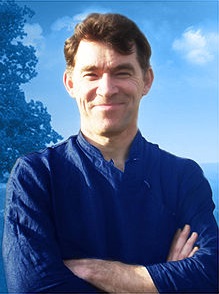Guest writer for Wake Up World
In my recent book Extraordinary Awakenings, I described how bereavement can be a catalyst personal transformation.
In the aftermath of bereavement, it’s not uncommon for people to undergo an intense form of post-traumatic growth. They may even change so radically that they feel as if they’ve become a different person – someone with a wider sense of perspective, a new sense of purpose and meaning, a sense of connection to nature, and deeper relationships.
In some of the cases, an important element of the transformation is a sense that the bereaved person was still in contact with the friend or relative they lost. For example, a woman called LeeAnn had a close friend who was murdered while working as a nightclub bouncer.
A few months later, LeeAnn was at home when, in her words,
All of a sudden, the room filled with this golden light. There was a sense of peace that was overwhelming…Then I saw Bruno in his human form. My eyes were closed, but he was standing there, surrounded by blue colors and light. He said to me, ‘You keep asking for me to come back. Don’t ask that — this is where I’m supposed to be.’1
Such experiences may sound bizarre, but they are common. In 1971, a Welsh doctor named William Dewi Rees became intrigued by some of his elderly patients commenting that they had sensed the presence of their deceased spouse. He followed this up with a systematic study of 293 widows and widowers in his group practice. Dewi Rees found that almost half (46.7 percent) of the widows and widowers had had a “hallucination” (in his term) of their spouse.2
One of the most interesting findings of Dewi Rees’s study was that only around a quarter of his participants had talked about their experiences before. This suggests a high degree of reluctance which might even have extended to Rees’s study itself, meaning that his figure of 46.7 percent of patients may be an underestimate.
More recent studies (which also might be affected by reticence, of course) suggest that as many as three-quarters of bereaved people have sensed the presence of a deceased loved one.3
The experiences occur in a variety of forms. Besides seeing the deceased person, it may be a strong feeling that they are nearby, watching or helping. It may be a sensory experience of smelling or hearing — for example, smelling their perfume, being touched by them, or hearing them call out. Less directly, people may feel that deceased friends and relatives are contacting them through animals or by symbolic means. In many cases, the experiences occur regularly so that people feel the deceased partners or relatives are still with them.
Interpreting Reports of After-Death Communication
The simplest explanation would be that these experiences are wishful thinking, self-delusion, or hallucinations. However, some after-death communications are difficult to dismiss in this way since they involve deceased people passing on messages which were later found to be relevant, or information that was later confirmed.
In one study of 1,667 after-death communications by the researcher Ken Vincent, around a fifth were found to be “evidential” in this sense, with three different types of evidence.4 First, there were experiences in which a person sensed or saw (often in a dream) the death of a person and found out shortly afterward that they had died.
Second, some experiences provided evidence that was later confirmed. In one example that was offered to me, a grandmother had a vivid dream in which she was having tea with the other grandmother of her grandchildren, who had died recently. The other grandmother warned her that their granddaughter was in danger from her violent boyfriend. After some trepidation, she spoke to her granddaughter. She admitted that her boyfriend had made death threats to her, and she split up with him shortly afterward.
LeeAnn’s experience above was also evidential in this sense. After her initial encounter, LeeAnn heard Bruno speak to her, asking her to text a message to his brother. She was reluctant to do so, as Bruno’s family were Mormon, and she wasn’t sure how they would react. But Bruno persuaded her and dictated the text to her.
Bruno’s brother called her immediately and said:
The text answered questions from thoughts and conversations that he had that day, when he was alone and was speaking out loud to Bruno and to God. He said the words were so specific he knew beyond a shadow of a doubt that they came from Bruno.
Thirdly, Vincent found that in some cases the experiences happened to more than one person. He provides the example of a young woman and her fiancé, who both saw a vision of her dead grandfather.
Potential Explanations
If these experiences can’t all be explained in terms of self-deception or hallucinations, what are we to make of them?
Some researchers have suggested that they could be explained in terms of psi powers such as telepathy or clairvoyance. For example, in the first case above, it’s possible that the grandmother unconsciously suspected that her granddaughter was being abused, and her unconscious mind created a dream scenario to relay the information to her conscious mind.
In LeeAnn’s case, perhaps she had telepathic contact with Bruno’s brother, sensed the questions he was asking, and created a response to them in her mind, which she texted to him.
However, in my opinion, these explanations seem tenuous and convoluted. LeeAnn told me that she isn’t aware of possessing any psi abilities, so it seems unlikely that, on this isolated occasion, she just happened to show the kind of powers that would allow her to transfer images to her roommate and to read questions from Bruno’s brother’s mind.
References:
(1) Taylor, S. (2021). Extraordinary Awakenings: From Trauma to Transformation. New World Library.
(2) Dewi Rees. W. (1971). The hallucinations of widowhood. British Medical Journal, 4(5778), 37–41. https://doi.org/10.1136/bmj.4.5778.37
(3) Keen, C. et al. (2012). Sensing the presence of the deceased: A narrative review. Mental Health, Religion & Culture, 16 (4), 384–402.
(4) Vincent, K. (2021) Study of evidential after-death communications. De Numine 70, 4-6, p. 5
Originally published at Psychology Today and reproduced with permission.
Recommended articles by Steve Taylor, Ph.D:
- Hypnotic Healing: What is Responsible for the Placebo Effect and Hypnosis?
- Beyond Religion: Will Human Beings Ever Transcend the Need for Religions?
- The Transformational Effects of Bereavement
- Post-Traumatic Creativity: How Psychological Turmoil Can Unlock Our Creative Potential
- The Meaning of Life May Be Life Itself
- Spiritual Depression
- Do Psi Phenomena Exist? A Debate (Part One)
- Do Psi Phenomena Exist? The Debate Continues
- David Ditchfield’s Remarkable Near Death Experience
About the author:
Steve Taylor is a senior lecturer in Psychology at Leeds Beckett University, UK. His latest books in the US are The Calm Center and Back to Sanity: Healing the Madness of the Human Mind. He is also the author of The Fall, Waking From Sleep, and Out Of The Darkness. His books have been published in 19 languages. His research has appeared in The Journal of Transpersonal Psychology, The Journal of Consciousness Studies, The Transpersonal Psychology Review, The International Journal of Transpersonal Studies, as well as the popular media in the UK, including on BBC World TV, The Guardian, and The Independent.
Connect with Steve at StevenMTaylor.com.

If you've ever found value in our articles, we'd greatly appreciate your support by purchasing Mindful Meditation Techniques for Kids - A Practical Guide for Adults to Empower Kids with the Gift of Inner Peace and Resilience for Life.
In the spirit of mindfulness, we encourage you to choose the paperback version. Delve into its pages away from screen glare and notifications, allowing yourself to fully immerse in the transformative practices within. The physical book enriches the learning process and serves as a tangible commitment to mindfulness, easily shared among family and friends.
Over the past few years, Wake Up World has faced significant online censorship, impacting our financial ability to stay online. Instead of soliciting donations, we're exploring win-win solutions with our readers to remain financially viable. Moving into book publishing, we hope to secure ongoing funds to continue our mission. With over 8,500 articles published in the past 13 years, we are committed to keeping our content free and accessible to everyone, without resorting to a paywall.








